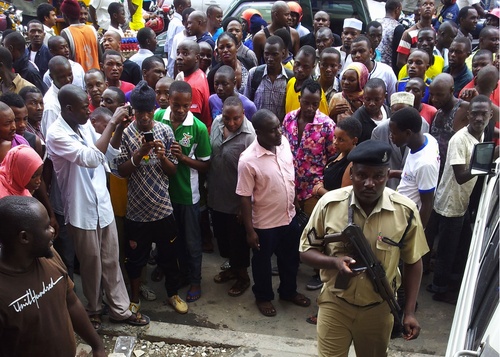 The mob scene in Kariakoo.
Photograph by Brielle Morgan.
The mob scene in Kariakoo.
Photograph by Brielle Morgan.
Critical Mass
Witnessing mob violence in Tanzania.
In Kariakoo, everyone’s hustling.
Vendors wearing tight tank tops and trousers fill the air with rhythmic promises of cheap prices and top quality. Drivers thump on horns, cyclists dodge and muscles strain under the weight of overloaded trailers and baskets.
The wild, sprawling Dar es Salaam market is the biggest in Tanzania. It’s the kind of place where you can haggle over a blender, score a flashy fake designer bag, and lose your wallet in the same breath.
The market is crawling with thieves, but it’s wise to think twice before pointing a finger and screaming, “Mwizi!” In dense and often desperate markets like Kariakoo, names can kill. This weekend while reporting in Kariakoo with my colleagues from Clouds TV, I witnessed how deadly names can be.
We were weaving through the mess of a market when suddenly we heard it: Mwizi! Thief!
A young man was running toward us down the street, his head spinning side to side frantically, his mouth agape, teeth invisible behind a crimson curtain of blood. A mob was forming around him. They came from all directions, improvised weapons in hand. The wild swing of a two-by-four brought him down. He disappeared out of sight behind the thickening mass of adrenaline and testosterone, the rise and fall of the two-by-four the only sign of his position.
Looking down at the mob from their vantage point above street level were several uniformed policemen and security guards. They stood, some laughing. Short machine guns dangled from their necks on black straps against crossed arms.
A 2012 report from the Legal Human Rights Centre called mob violence one of the biggest right-to-life threats that faces Tanzania’s population of 48 million.
According to cited police statistics, 1,234 people—including nine police officers—were killed by mob violence in 2012 (as of December).
Researchers concluded that “Incidents of mob violence have continued to escalate in the country with each coming year,” reaching “an alarming stage.” While the statistics are disturbing, they can’t fully communicate the horror of seeing someone at the mercy of a mob.
Not knowing exactly what to do but compelled to act, I ran up the stairs to the idle pool of armed men and started screaming at them to do something.
“What are you doing?” I yelled in a mess of English and Swahili. “It’s better that you help!”
“It’s okay. Stay back,” they told me, stretching their arms out to protect the lunatic mzungu (foreigner).
“No, it’s not OKAY. They’re killing him!”
They refused to move, so I started yelling at the mob. “Stop” and “fuck” were pretty much all I could think of to say.
By this point the mob had chucked the guy down a set of stairs. Several people ran off in search of petrol and matches. Setting alleged thieves ablaze is part of the routine.
Finally one of the policemen intervened, dragging the “accused” up and out of the stairwell by the cuffs of his jeans. The circle of young men whipped out their cell phones and started taking photos of the exhausted, bleeding human on the cement.
My colleagues beckoned me down from the top of the stairs. As we made our way out of the crowd, strangers apologized to me as I passed.
“Pole sana, mzungu. Pole.”
Right, because I was the one in need of an apology.
In the news van, we debated what we’d seen, whether it was justified and whether it was newsworthy. A fellow reporter admitted to having participated in mob violence.
“Wait until you’ve had something stolen from you, Brielle,” he said. “If someone comes into my house and steals things I’ve earned with my money for my family, I’m going to give him the beating of a lifetime.” He was only half-joking.
In the same breath he agreed that though what we saw wasn’t fair, it also wasn’t news. This was a popular opinion in the van, although the occasional story about someone getting lynched or burned alive does make the newspapers.
“Filler,” Athuman Mtulya told me. He’s a local reporter with an English-language paper called the Citizen. “The tragic incidents have become a normal experience [so] that reportage is with minor interest.”
In the van I, the ignorant and clearly emotionally unhinged Canadian, continued pressing the issue. If we as journalists accept this as normal, who will hold the police accountable for their inaction? Who will hold the people perpetrating the violence accountable?
My colleagues had a variety of answers for me: the police don’t do anything when you report minor theft, thieves know what fate they’re tempting, people won’t care if we show these stories because it happens everyday.
Eventually you become numb.
“You saved a life today, Brielle!” they congratulated me back at the office when my colleagues relayed the story.
Maybe. I also walked away without ensuring the victim got medical attention. I didn’t ask the police for their names or take their badge numbers. I didn’t try to interview any witnesses and I didn’t capture any of the attackers on camera.
The embarrassment of being the only one crying out got the best of me, and I left.
This piece was written with the support of Journalists for Human Rights. Find more of their work here.





